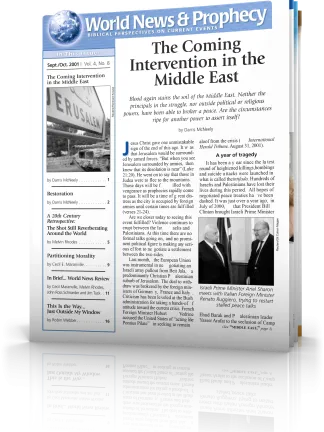In Brief... Miracles or Monsters?
As long as there are scientists without ethics and people willing to finance their work, the possibility of human cloning is extremely high. However, the possibility of successful human cloning is not.
Liberal scientists Panos Zavos and Severino Antinori rocked the world with their bold announcement in August that they would begin to clone humans before the end of this year. Is it possible? The rest of the scientific community does not seem to doubt that it is. The question is: What will their efforts produce?
The probability of miscarriages, premature deliveries, genetic abnormalities and stillbirths is extremely high. Much publicity has been given to Dolly, the cloned sheep that was born in 1997. However, little coverage has been given to the fact that hundreds of animals are born dead or with terrible defects in cloning attempts gone wrong.
Among those defects are serious lung problems, as well as disorders of the heart, blood vessels, the immune system, bones, brain and kidneys. Scientists have warned that we should expect similar outcomes in human clones.
Potentially, there will be additional problems that aren't easily detected in animals, such as behavioral abnormalities, learning difficulties, problems with sociability, aggressiveness and emotional instability.
Even Dr. Ian Wilmut, who was the leader of the team that cloned Dolly, issued a gloomy warning about the high probability of serious problems in human cloning efforts.
An additional unresolved problem is the fact that some fetuses grow to an enormous size, so huge that their size could threaten the health of a woman pregnant with a clone. Scientists do not know what goes haywire in the genetic coding that causes this phenomenon.
Many governments have passed legislation that bans human cloning, including a recent bill voted on by the U.S. House of Representatives. However, that's unlikely to stop the mad pursuit of cloning. It holds a certain intrigue for the scientist. "Let's see what we can do" is so loud that it shouts down the quieter whispers of conscience.
A potential candidate for the U.S. Congress has already spent hundreds of thousands of dollars in an attempt to clone his infant son who died in surgery. Mark Hunt, a wealthy attorney, told the manager of a cloning laboratory, "I will spend every dime I have to get my son back." When the manager explained that cloning would not recreate his son, Hunt replied: "At least I will have one who looks like him."
As long as there are scientists without ethics and people willing to finance their work, the possibility of human cloning is extremely high. However, the possibility of successful human cloning is not.
Sources: Lois Rogers and Joe Lauria, Times Newspapers Ltd.; Michael Woods, The Toledo Blade; Janelle Carter, AP; Agence France Presse.






